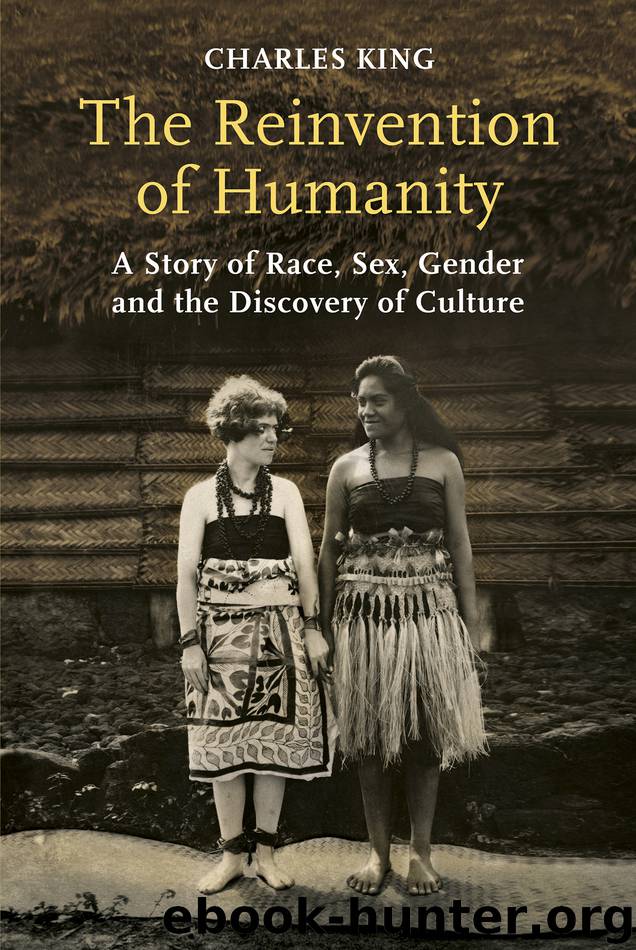The Reinvention of Humanity by Charles King

Author:Charles King
Language: eng
Format: epub
ISBN: 9781473547896
Publisher: Random House
LIKE MANY TRIBAL GROUPS on the northern prairie, the Omaha were relatively recent migrants to the region. At some point in the seventeenth century, they had gradually moved from the eastern woodlands and down the Ohio and Wabash rivers, perhaps because of conflicts with the Iroquois. Over time they split from and coalesced with other neighboring peoples, many of whom also spoke languages derived from the common Siouan family. By the early eighteenth century, French cartographers and fur trappers found them on the upper Missouri. They had developed the semi-nomadic horse culture that would come to define the lifestyle and economy of many Plains peoples.
Because of their geographic location—as one of the easternmost of the Plains tribes—the Omaha were often the first aboriginal people encountered by traders and explorers setting out for the American West. That also meant they were typically among the earliest Plains societies to see their tribal hunting grounds shrink. Every year their lands were crisscrossed by new sets of oxen tracks and wagon ruts. Despite a basketful of treaties with the U.S. government—in theory, a protection against exploitation and expropriation—the Omaha were removed to reservation lands as early as the 1850s. From that point on, white Americans were more likely to associate their name with the capital of Nebraska, the state into which most of their reservation fell after its admission to the union in 1867, than with the aboriginal society itself.
The reservation system attracted physicians, schoolteachers, missionaries, and later in the century, amateur researchers eager to contribute to the work of John Wesley Powell’s Bureau of American Ethnology. One of them was James Owen Dorsey. An Episcopalian minister originally from Baltimore, Dorsey spent the early 1870s living and working among both the Omaha and the neighboring Ponca. He was particularly taken with the Omaha’s complex kinship structure. Like many Native American societies, the Omaha were divided into two major lines of familial descent—or “moieties,” as ethnologists called them. Social custom prohibited marriage inside the same moiety and prescribed the types of relationships that were possible within or across these lines. Like European royals’ debating which pairings of cousins would be appropriate and which unthinkable, the Omaha had a spectacular ability to work out endlessly complex family connections, the permissible as well as the prohibited, based on this scheme.
Dorsey had begun as an unschooled enthusiast of native peoples, much as Lewis Henry Morgan had been earlier in the century. He thought Indians might be one of the lost tribes of Israel. They might even have retained elements of Hebrew in their native languages. Actually living with them, however, convinced him otherwise. Through the detailed collection of word lists, testimony about religious rituals, and oral histories of migration and warfare, he was able to assemble one of the most sensitive, detailed, and historically minded studies one could have imagined. He was pleased when Powell’s bureau agreed to publish it. The work appeared in 1885 with the simple title Omaha Sociology.
In a discipline that was still in a state of becoming, Dorsey’s research achieved the status of a classic.
Download
This site does not store any files on its server. We only index and link to content provided by other sites. Please contact the content providers to delete copyright contents if any and email us, we'll remove relevant links or contents immediately.
| Civilization & Culture | Expeditions & Discoveries |
| Jewish | Maritime History & Piracy |
| Religious | Slavery & Emancipation |
| Women in History |
Cecilia; Or, Memoirs of an Heiress — Volume 1 by Fanny Burney(32559)
Cecilia; Or, Memoirs of an Heiress — Volume 2 by Fanny Burney(31957)
Cecilia; Or, Memoirs of an Heiress — Volume 3 by Fanny Burney(31943)
The Secret History by Donna Tartt(19093)
Sapiens: A Brief History of Humankind by Yuval Noah Harari(14392)
Leonardo da Vinci by Walter Isaacson(13338)
The Radium Girls by Kate Moore(12032)
Sapiens by Yuval Noah Harari(5372)
How Democracies Die by Steven Levitsky & Daniel Ziblatt(5219)
The Wind in My Hair by Masih Alinejad(5095)
Homo Deus: A Brief History of Tomorrow by Yuval Noah Harari(4920)
Endurance: Shackleton's Incredible Voyage by Alfred Lansing(4785)
Man's Search for Meaning by Viktor Frankl(4607)
The Silk Roads by Peter Frankopan(4536)
Millionaire: The Philanderer, Gambler, and Duelist Who Invented Modern Finance by Janet Gleeson(4479)
The Rape of Nanking by Iris Chang(4215)
Joan of Arc by Mary Gordon(4115)
The Motorcycle Diaries by Ernesto Che Guevara(4105)
Stalin by Stephen Kotkin(3969)
